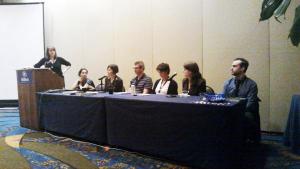What makes the writer-editor relationship work? In a frank discussion between freelance writers, staff editors and a highly participatory audience, the “Working with Editors” session at the annual NASW meeting focused on the relationship forged after an assignment commission. Panelists fielded audience questions that ranged from whether to handle writers with kid gloves to asking for just 15 more minutes from an editor to if editors cared about small details such as fonts. (No, they do not care.)
Co-organizers and moderators Monya Baker and Jessica Marshall solicited stories and questions for the panel with a pre-meeting blog post and, before the session began, bid attendees to share only insights. “If your overall question boils down to ‘Isn’t that awful?’ save that for coffee hour,” Marshall said.In a response to the blog post, WIRED senior editor Adam Rogers asked, “Are we really so opaque and mysterious?” to which Marshall replied in her introduction, “Maybe not if you’ve been doing this for a long time, but if you’re just starting out, absolutely!”
Panelist and Popular Science articles editor Jennifer Bogo says relationships work when both writer and editor think of it as a collaborative process. “We’re both serving the reader,” said Bogo, and so there shouldn’t be any surprises if there’s been a steady flow of communication in both directions. Acknowledging a power differential, however, and admitting that sometimes “editors go dark,” Bogo advised writers not to be discouraged and not to be afraid to email.
Reframing the power imbalance, freelance writers and panelists Bryn Nelson and Helen Fields each used the acronym A.P.H. (Annoyances Per Hour) in evaluating whether to work again with an editor or publication. Nelson advised writers to consider their jobs as “making editors’ lives easier” by being their problem-solvers, but that writers should consider the editor’s or publication’s A.P.H. as just as important as the quality of the contract and pay rate for future assignments. Describing working with editors as “complicated and interesting,” Fields said she thinks an editor’s job includes “insulating me from the craziness of their publications,” so the A.P.H. ought to be only on the publication’s part. The editor should be on the writer’s team, and together they keep others from ruining “our little baby.”
Currently working with Fields on a feature for Discover, panelist and senior editor Siri Carpenter treasures “really open channels” and hopes writers even feel free enough to say to their editors — as Fields recently had to her: “I am just really hating this story right now.” Panelist and Men’s Journal associate editor Stayton Bonner added that open communication leads to many types of conversations but reassured writers to “never take anything personally in terms of editing” and that you should be persistent in your queries “until you hear ‘no.’”


